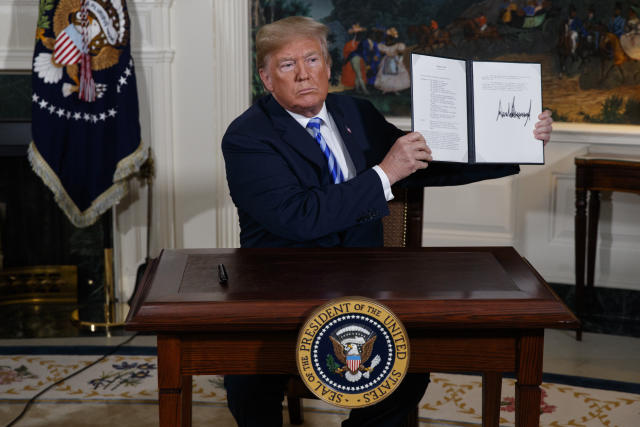
This article is more than
7 year old
“The reality is clear,” Obama said Tuesday. “The JCPOA is working — that is a view shared by our European allies, independent experts, and the current U.S. Secretary of Defense. The JCPOA is in America’s interest — it has significantly rolled back Iran’s nuclear program. And the JCPOA is a model for what diplomacy can accomplish — its inspections and verification regime is precisely what the United States should be working to put in place with North Korea.
“Indeed, at a time when we are all rooting for diplomacy with North Korea to succeed, walking away from the JCPOA risks losing a deal that accomplishes — with Iran — the very outcome that we are pursuing with the North Koreans,” the former president continued. “That is why today’s announcement is so misguided. Walking away from the JCPOA turns our back on America’s closest allies, and an agreement that our country’s leading diplomats, scientists, and intelligence professionals negotiated. In a democracy, there will always be changes in policies and priorities from one Administration to the next. But the consistent flouting of agreements that our country is a party to risks eroding America’s credibility, and puts us at odds with the world’s major powers.”
Stressing that policy “debates in our country should be informed by facts,” Obama detailed six “facts,” noting that the agreement was reached after building an international coalition that included the United Kingdom, France, Germany, the European Union, Russia, China, and Iran; it has succeeded in “rolling back Iran’s nuclear program”; the deal is “strictly monitored” by international watchdogs; Iran is in compliance with the agreement; the agreement never expires; and the deal “was never intended to solve all of our problems with Iran.”
“We were clear-eyed that Iran engages in destabilizing behavior — including support for terrorism, and threats toward Israel and its neighbors,” Obama said. “But that’s precisely why it was so important that we prevent Iran from obtaining a nuclear weapon.”
He added, “I believe that the decision to put the JCPOA at risk without any Iranian violation of the deal is a serious mistake.”

In announcing the U.S. withdrawal from the deal, Trump said that “we have definitive proof that this Iranian promise was a lie.” Trump cited Israeli Prime Minister Benjamin Netanyahu’s recent assertion that Iran had lied about its nuclear program before the 2015 agreement was struck but did not offer new evidence.
The leaders of France, Britain and Germany quickly denounced Trump’s decision.
Kerry, who has been publicly lobbying for U.S. allies in recent weeks to salvage the agreement, issued his own statement condemning the withdrawal.
“Today’s announcement weakens our security, breaks America’s word, isolates us from our European allies, puts Israel at greater risk, empowers Iran’s hardliners, and reduces our global leverage to address Tehran’s misbehavior while damaging the ability of future administrations to make international agreements,” Kerry said. “No rhetoric is required. The facts speak for themselves. Instead of building on unprecedented nonproliferation verification measures, this decision risks throwing them away and dragging the world back to the brink we faced a few years ago.”
Kerry added, “The extent of the damage will depend on what Europe can do to hold the nuclear agreement together, and it will depend on Iran’s reaction. America should never have to outsource those stakes to any other country. This is not in America’s interests. We should all hope the world can preserve the nuclear agreement.”
Read more from Yahoo News: